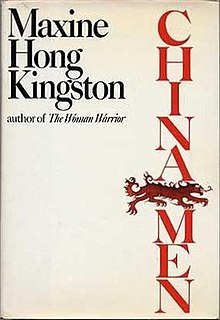 First edition dust jacket | |
| Author | Maxine Hong Kingston |
|---|---|
| Language | English |
| Genre | short-story cycle |
| Publisher | Alfred A. Knopf |
Publication date | 1980 |
| Publication place | United States |
| Media type | Print (hardback & paperback) |
| Pages | 308 |
| ISBN | 0-394-42463-8 |
China Men is a 1980 collection of "stories" by Maxine Hong Kingston. It is a sequel to The Woman Warrior with a focus on the history of the men in Kingston's family. It won the 1981 National Book Award for Nonfiction.[1][a]
Kingston wrote The Woman Warrior and China Men as one and would like them to be read together; she decided to publish them separately in fear that some of the men's stories might weaken the feminist perspective of the women's stories.[2] The collection becomes what A. Robert Lee calls a "narrative genealogy" of Chinese settlement in the United States. To tell their stories, many of which Kingston heard only through the talk-story of the women in her family,[2] she mixes the known history of her family with hypothetical imaginings and with the legal history of Chinese America. Her book presents a picture of a United States still changing in its reciprocal influence with China.[3] At the same time, the title reflects a deliberate rejection of American racism against the Chinese: whereas the term "Chinaman" was a common slur (such as in John Chinaman), the Chinese referred to themselves as the "China Men" of the title: tang jen (Chinese: 唐人; pinyin: Tángrén).[2]
Some of the main characters in the book include Kingston's great-grandfather Bak Goong, who worked on the sugar plantations in Hawaii; her grandfather Ah Goong, who worked for the railroad construction companies; her father BaBa, a gambling house owner and laundryman; and her unnamed brother, who receives no honor for fighting for the US in Vietnam.[3] These characters are at times presented more as archetypes than as individuals, and at times there are competing versions of the story, as if the characters represent all the possible forefathers of the Chinese American population; as Elaine H. Kim points out, the father character "immigrates to America in five different ways, by way of Cuba, Angel Island, or Ellis Island [...] He could have entered the country legally, or he could have come as a paper son or by some other avenue. He is both 'the father from China' and 'the American father.'"[2]
- ^ "National Book Awards – 1981". National Book Foundation. Retrieved 2012-02-21.
- ^ a b c d Kim, Elaine H. (1982). "Chinatown Cowboys and Warrior Women: Searching for a New Self-Image". Asian American Literature: An Introduction to the Writings and Their Social Context. Philadelphia: Temple UP. pp. 207–213. ISBN 0-87722-260-6.
- ^ a b Lee, A. Robert (2003). "Landmarks: Ellison, Momaday, Anaya, Kingston". Multicultural American Literature: Comparative Black, Native, Latino/a and Asian American Fictions. UP of Mississippi. pp. 35–36. ISBN 1-57806-645-X.
Cite error: There are <ref group=lower-alpha> tags or {{efn}} templates on this page, but the references will not show without a {{reflist|group=lower-alpha}} template or {{notelist}} template (see the help page).
© MMXXIII Rich X Search. We shall prevail. All rights reserved. Rich X Search
